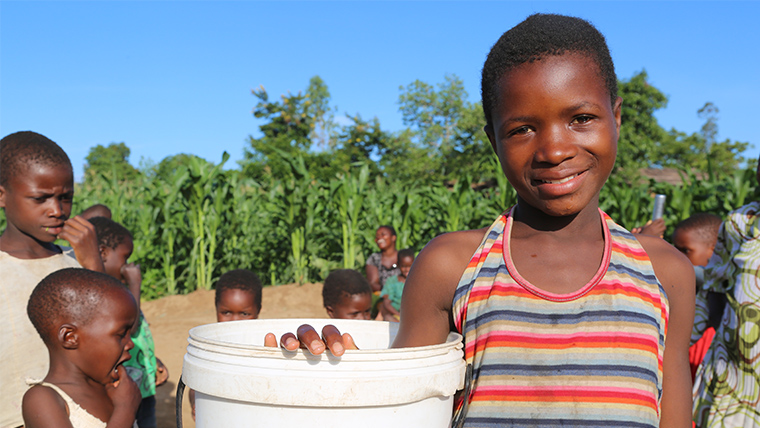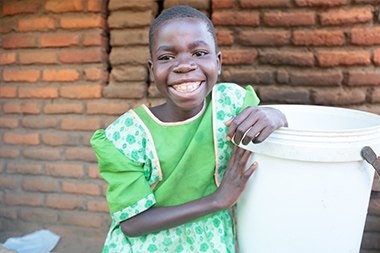Every drop counts | Clean water in Malawi

The first thing you notice about the village is its beauty.
Lush with green, tall grass, fields of maize and vibrant rolling hills, it’s a beautiful place to call home. The kids are usually smiling, time and again; their parents are working hard in the gardens.
It feels like a truly wonderful place to grow up.
However, many years ago, there was a problem.
Community member and grandmother, Enelesi, says she cannot say how long she had to wait to finally witness the arrival of clean water in her village in southeastern Malawi.
For the first 65 years she lived in the village, the river provided all the water they had ever known.
“We all wanted clean water,” she told us. “While we were drinking from the river, our men would try to dig shallow wells close to our homes so that we would at least get water closer.”
But these shallow wells proved to be very risky; women struggled to balance when pulling the water buckets up, and some fell into the well.
During dry seasons, the wells would dry up and the river was once again the only source of water.
Enelesi’s granddaughter Priscilla was born in 2006. When she lost both her parents a few years later, Enelesi and her husband took her in.
Like her grandmother before her, Priscilla was born in a community that drank from the river and inherited an impossibly difficult life.
It was a community where women faced severe problems getting water, an asset they could not live without.
While it might be different in other cultures, in Priscilla’s village, getting water is considered a woman’s role. She woke up in the morning with her mother and trekked to the stream where they got the water.
When her mum died, she began making the journey on her own. Since her maiden walk when she was just six-years-old, walking to and from the river became one routine of her life.
It was a difficult task, and it never got any easier.
 “Sometimes we woke up at four and sometimes five in the morning,” Priscilla told us.
“Sometimes we woke up at four and sometimes five in the morning,” Priscilla told us.
“Most of the time I would be with my mum and together we went to the river.”
At times, she went with friends, picked up her pail and headed to the water source to do her part for the family. She never complained.
Whilst her time was spent searching for water, her education took a back seat.
Priscilla recounts one time in 2014 when she arrived at the river and found it almost dry.
“That day I got there at six in the morning,” she says. “Sadly, we found a line of pots and women so long that I could not wait to get water to bathe and go to school. I went to school without a bath and I was late for an exam,” she said glumly.
In all this, Priscilla was not alone. There were hundreds of other girls from her village and other neighbouring sites who were also walking miles for water.
When World Vision began working in Priscilla’s community, less than 70 percent of the villages had access to clean water, and Priscilla’s village was one of them.
Andrew Mbewe, Chairperson for the Water Point Committee, said that as soon as World Vision arrived, community members highlighted clean water as an area that needed urgent attention. He says that, as a community, they believed that by addressing the water problem, not only could girls be liberated but families would be strengthened as women would be spending less time on the road getting water.
“It is not true that issues of water do not affect us as men,” said Mbewe. “We are equally concerned as our women and children because when we drink unclean water, we get sick and the family’s economic life stalls.”
Mbewe also revealed that during summer times when the river often went dry, as men, they mobilised each other and dug shallow wells to ensure that there would still be water.
But with a borehole drilled, Priscilla has forgotten all the pain about the past. It’s now easy for her to collect water with her friends.
Her grandmother Enelesi is equally happy to see her child work hard at her primary school where she has just been elected by her Year 3 classmates as a monitor.
She helps the teacher with cleaning the board, distributing books and ensuring that her friends are on-time for their lessons. Priscilla tells us that she wants to be a teacher when she’s grown up, and sees she is going in the right direction to achieving her dream.
When we started working in Malawi, less than 70 per cent of the group of villages in Priscilla’s area had access to clean water. By making water more accessible to her family, we’re helping them to cope with the severe effects of El Nino-related drought, that is currently affecting around 30 million people across Southern Africa. Find out how you can help »